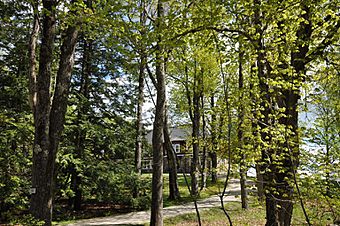Mason House (Dublin, New Hampshire) facts for kids
Quick facts for kids |
|
|
Mason House
|
|
 |
|
| Location | Snow Hill Rd., Dublin, New Hampshire |
|---|---|
| Area | 2 acres (0.81 ha) |
| Built | 1888 |
| Built by | A.L. Ball |
| Architect | Alexander Wadsworth Longfellow |
| Architectural style | Georgian Revival |
| MPS | Dublin MRA |
| NRHP reference No. | 83004049 |
| Added to NRHP | December 15, 1983 |
The Mason House is a very old and special home in Dublin, New Hampshire. It was built in 1888. This house is a great example of a building style called Shingle style. It also has parts that look like Richardsonian Romanesque designs. These ideas came from the famous architect Alexander Wadsworth Longfellow. His teacher, H. H. Richardson, inspired him. The Mason House was added to the National Register of Historic Places in 1983. This means it is an important historical building that should be protected.
About the Mason House
The Mason House is in the middle of Dublin, New Hampshire. You can find it on Snow Hill Road. It sits on a high area that looks over the hills of Peterborough.
What the House Looks Like
The house has two floors. The first floor is made of rough stone. The second floor is covered with wooden shingles. It has a sloped roof and many windows. These windows are grouped together along the walls.
Its History and Design
Alexander Wadsworth Longfellow designed the Mason House. It was built in 1888. At first, it was a three-story summer home. In 1950, it was changed to two stories. This was done so people could live there all year.
The house's style reminds people of early work by H. H. Richardson. Longfellow used to work for Richardson as a designer.
Who Lived There?
The house was built for two sisters named Ella and Ida Mason. They were friends with Raphael Pumpelly, who had a summer home nearby.
Later, important people stayed at the Mason House. In 1910, James Bryce lived there. He was the UK Ambassador to the United States at the time. An ambassador is a person who represents their country in another country. Because of him, the house was sometimes called the "British Summer Embassy."
Other ambassadors also used the house for their summer stays. These included Sir Cecil Spring Rice, who was also a UK ambassador, and Henry White, an American ambassador.



